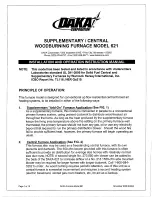
21
139262 Rev_H
9 / 11 / 2012
Operation
The blower is controlled by the heat-activated snapstat that
will only function when the control switch is set in AUTO.
After the fire is established, the snapstat will react to the
heat and activate the blower. Fan speed may be manually
adjusted with the rheostat knob. The blower will shut off
automatically as the stove cools down. If automatic blower
circulation is not desired, place the blower control switch in
the MANUAL position.
Maintenance
Disconnect the blower from its power source before
cleaning or servicing.
Regular cleaning will help ensure you obtain maximum
life from the blower. Use a vacuum with a soft brush
attachment to clean the blower fans and motor housing
at least monthly, or more frequently if there are pets in
the home. Keep the area under the stove free of dust and
debris.
8. Route the power cord
to the nearest electrical outlet.
9
10
1
2
3
5
6
7
4
4
8
10
10
A
1. Blower Assembly
2. Blower Mounting Bracket
3. Air Deflector
4. Control Box Assembly
5. Control Box Bracket
6. Snapstat
7. Snapstat Bracket
8. M6 Flange Hex Nut (3)
9. M6 Wingnut (2)
10. #8 x 1/2” sheet metal screws (9)
Figure 23. Blower Parts Identification.
10
B
Lower Air Deflector
Figure 24. Blower wiring diagram.








































